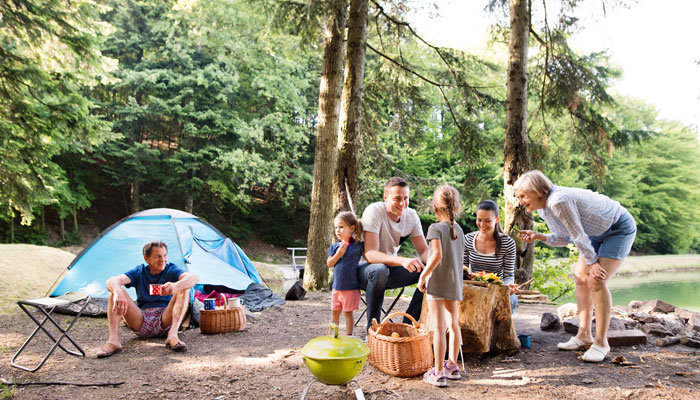
Camping is a fun and relaxing experience if you are properly prepared. Unfortunately, it’s easy for the trip to turn sour if you run out of food, or a good night’s sleep.
Plan by starting your preparations early. Start with choosing a campground that is close to the activities you like.
Pitch the Tent Early
If you’re a first-time camper, it is best to practice setting up your tent in the yard before you head out to the campground. This will save you time, as well as ensure that all the parts are in place. This is also a great way to test out any other gear you’re taking, such as camping stoves or sleeping bags. Make sure they fit comfortably and that all the zippers are working properly, too.
If possible, set up your tent in an area protected from the prevailing wind. In particular, if the winds are strong, look for campsites that offer some natural windbreaks like a stand of trees or a hill between you and the prevailing breeze. This will help reduce the impact of the wind on your tent and help you sleep better at night.
Additionally, if you’re going to be in an area where the ground is likely to get wet, consider bringing a tarp to camp under. It will give you extra protection from the rain and keep your belongings dry. You can also use the tarp to cover your cooking/eating area to protect it from rain, as well. Finally, remember to bring a pillow or two for comfortable resting while you’re camping. This will allow you to fall asleep easier and faster.
Pack the Right Gear
The things you need to pack will vary based on the type of camping trip you’re planning. Whether you’re glamping or pitching your tent in the great outdoors, you’ll want to pack personal hygiene items, camping utensils, and the proper clothing for the climate where you’re going. If you’re hiking, it might be a good idea to pack waterproof shoes and a backpack that can handle the extra weight.
You’ll also want to pack a first-aid kit, plates and cups, cooking utensils, a stove with fuel, sleeping bags and pillows, and flashlights or headlamps. It’s a good idea to label each bag so that you can find what you need quickly, and make sure you have plenty of trash bags in case you need to pack out any waste.
When purchasing gear, read reviews on websites like REI or Amazon and talk to employees at outdoor stores about their experience with certain products. They’ll often have the inside scoop on the newest and greatest in camping equipment, and they’ll be able to offer helpful tips for surviving your trip. You should also plan out your menu before heading out on the trail, figuring out which meals will fit in with the recreation activities you’ll be engaging in.
Leave the Animals Alone
Wildlife often hangs out around campgrounds, but it is important to leave them alone. You don’t want to startle them and cause them to run away. Also, certain times of the year may be mating or nesting seasons, and animals will be extra sensitive to humans. This is when they will be even more likely to abandon their young or become aggressive to protect them.
Additionally, some critters might try to attack your pet, especially if it is a small or sick animal. It is important to keep this in mind when choosing a campground and packing food for your trip. If possible, store all of your food in tightly sealed containers that don’t give off a strong odor.
If you do bring your dog on a camping trip, make sure it is well-trained and that it is microchipped. It is also a good idea to carry up-to-date pictures of your dog with you. Also, remember that tents are not soundproof and your dog will hear all of the noises going on around it.
If your dog has separation anxiety, you should practice leaving it home alone before your camping trip. You should start by leaving it for just a few minutes and gradually increase the amount of time that you are gone. Also, you can give your dog special toys to play with during the time that it is alone, and this will help it feel more secure when you are away. Plus, while you’re preparing for your outdoor adventure, keep an eye out for helpful deals like the Sport and Outdoor to save on your camping gear and accessories.
Pack a First-Aid Kit
When you are in the wild, there is often not a convenient place to run and get medical attention if something goes wrong. That is why it is so important to pack a first-aid kit. You can either purchase a comprehensive kit or make your own. Whatever method you choose, it should contain a list of essential items including gauze, antiseptic wipes, and a first aid manual. It should also contain personal medications (including EpiPens) and a list of your allergies. Depending on where you are going, you may need to add other camping-specific items like a tick remover or poison ivy treatment.
You will likely have a few scrapes and bruises and maybe even some sprains and burns while camping. That is why it is important to have a first-aid kit that is heavy on cuts, grazes, and sprains. It should also include a pain reliever and an antihistamine cream. You will want to be sure you have plenty of gauze in your first-aid kit because it is useful for cleaning wounds and preventing infection. It can also be used to tape a bandage in place if you need to wrap something up.
Adding a first-aid kit to your camping gear is one of the most important things you can do to prepare for a trip. You can find a variety of first-aid kits on Amazon and by speaking with your local outdoor store. You should also consider taking a wilderness first-aid course so you can be the best-prepared camper possible, all while keeping an eye out for the latest deals like the White Duck Outdoors Coupon to save on your camping essentials.
Pack a Cooking Utensil Kit
Whether you’re going tent camping or staying in a cabin, you will need some cooking supplies. Finding the right balance between what you need and what you can bring is essential to enjoying a camping trip without overpacking.
The first thing you need is a set of durable and lightweight cooking utensils. Trade your spoon and fork for a spork or choose pots and pans with marked and labeled measurements to make the most of your space in your backpack.
You’ll also need a few kitchen items like plates, cups, and bowls. Collapsible or stackable camping dishes can save space in your pack while making them easier to carry. For a camping trip with more than one person, consider choosing dishes that have handles to help prevent dropping them.
You will need a way to eat your meals, so make sure you bring a campfire grill or portable stove and the necessary fuel for it. You will also want to bring a fire starter, like a lighter or matches, as well as a fire blanket and a large, durable bag to keep the flames under control while you cook. You will need a way to clean your dishes, so be sure to bring an environmentally friendly dishwashing soap that won’t harm the surrounding environment.
Pack a Water Filter
If you want to stay safe on your camping trip, a water filter is an essential item. This will allow you to drink fresh, clean water even if the natural water source is polluted or unreliable. There are many options on the market, including physical purifiers that can remove viruses and bacteria from water as well as chemical purifiers that work by scrambling DNA.
For the best results, you should test your new water filter at home before going on a trip. You should also consider packing a backup water filter in case yours fails while you are camping, or you need to change filters during the trip.
Camping offers a great way to see new places and experience different types of landscapes, but it is important to make sure you are prepared for anything. By following these tips, you can have a successful camping trip without having to worry about anything unexpected. Whether you are planning a weekend getaway or an extended backpacking expedition, it is important to be ready for whatever adventure awaits you. And a good water filter can make a world of difference in your enjoyment. Until recently, UV light, chemicals, or boiling was the only way to decontaminate water, but advances in technology now offer a convenient, effective, and lightweight method of protecting yourself from questionable waterborne pathogens.
Pack a Backpack
Whether you’re planning a 3-day camping trip or a weekend excursion, a good backpack is an essential piece of gear. But finding the right pack is only half the battle—you also need to know how to properly load it with gear.
Most backpacking experts agree on the basics: start with a well-fitting pack and only bring what is necessary for your trip. Then, lay out all of your gear for a visual check before packing it in. This step will help you cut any gear that may be unnecessary, which is important for reducing pack weight and making your hike more comfortable.
Then, pack any items that can fit into exterior pockets or attachments first (e.g., a water filter, toilet paper, headlamp, and some extra snacks). Next, stuff the bottom of the pack with bulky items that are easy to access, like your sleeping bag and nighttime clothes. These items are usually packed in a compression sack or stuff sack, which will save space.
Finally, pack your other heavy or dense items in the middle of the pack, like your tent and rainfly. You want these to be against your back and away from your legs, so you can easily reach them when you need them on the trail.
Conclusion
A good camping trip needs to be well-planned and prepared for. Remember to choose a suitable campsite, pack appropriate gear, and bring enough food and water. Stay safe by keeping a first aid kit and following proper fire safety practices. Respect the environment by leaving no trace and following all park regulations. Finally, embrace the outdoors and have fun! By following these essential tips, you can make your next camping trip a memorable and enjoyable experience.








